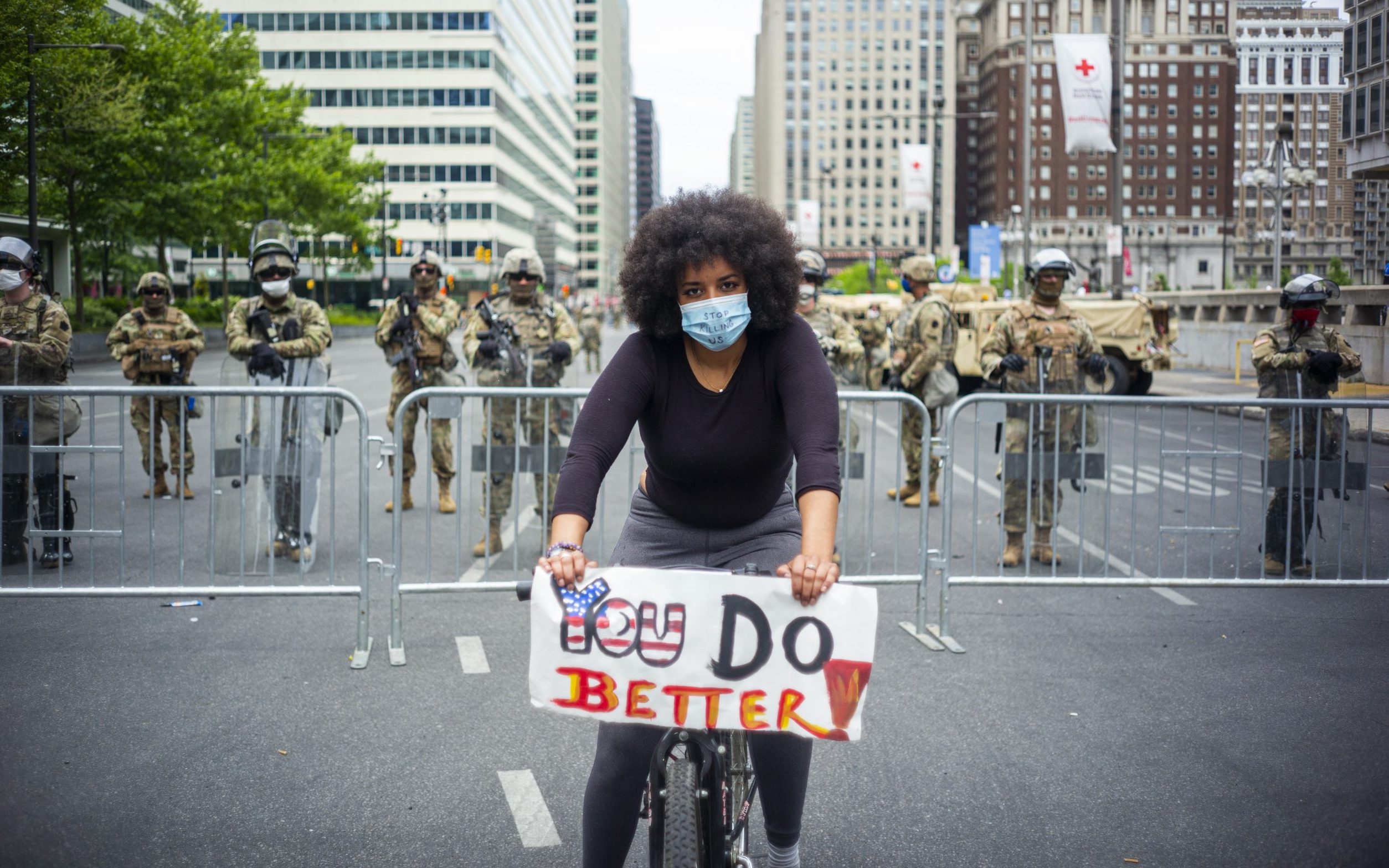America owes its independence to Black people, and don’t forget it
America belongs to Black people. I didn’t stutter, and I don’t have a ‘but’ coming, either. I said what I said.
This country was built on the backs of Black people. Not parts of it. All of it. Every city, town, and corporation that exists in America was made possible by Black Americans. This is not an exaggeration.
From the enslaved Africans whose labor made it possible for 39 white men to sit around and draft the Constitution without having to lift a finger to tend to their own survival. To the Black men during the Jim Crow era who were snatched off of the streets and leased to private companies for work on chain gangs and in coal mines. Every piece of this country’s wealth is intricately linked to the suffering of Black people.
READ MORE: Ohio seeks to amend slavery law still on the books

America’s successes are so entangled with its morally racist failures that none of this can be cleanly divided. But if I know nothing else, I know that the work that was put in by Black people has never been justly compensated.
America owes its very independence to the Black people that it continues to marginalize. To understand why there’s a debt in the first place, you have to understand the historical role that free Black labor played in catapulting America from being simply the teenager who ran away from home with daddy’s credit card to the seemingly self-sufficient socialite who now poses for photo-ops on the world stage.
READ MORE: California reporter slammed for setting up fake activism photo-op for Instagram
That increase in stature didn’t happen by accident. Money didn’t simply fall into America’s lap. Other countries didn’t just start respecting the colonists because they had fancy wigs and the silkiest ascots around. They began to respect them because America started having the type of money that could buy them a seat at the table — or at least buy the firepower for the wars that cleared the pathway to the table.
At only 244 years old, America is a baby compared to many of the world’s largest economies, most of whom are over a thousand years old. Yet, with a current GDP at 21 trillion dollars, America has the financial clout to run circles around all of them.
Every single one.
The United Kingdom (GDP at 2.8 trillion), Russia (GDP at 1.7 trillion), Japan (GDP at 5 trillion), India (GDP at 2.8 trillion), and every other country on the planet has a smaller GDP than the United States. China is America’s closest competitor with a GDP of 14.3 trillion, but it’s also one of the world’s oldest countries, dating back almost 3000 years.
Compared to these economies, who’ve all been in existence well over a thousand years, America feels like an overnight success story. And it is. A bloody one. A morally defunct one. One where it cut out its initial investors (*cough, cough* Black people) and hoarded all of the profit for itself. Because America, like many startups, didn’t bankroll itself.

Black people were the venture capitalists for the colonial American enterprise (1619 – 1776)
Blacks provided the seed money to jumpstart this whole enterprise. How? Through free labor. That labor equated to cold, hard cash. Better than cash even. Cash is gone once it’s spent. Black people were America’s own renewable fountain of wealth.
Black people were to America in human form what natural oil was to the richest Middle Eastern countries. Before the 18th century ended, there were approximately 700,000 enslaved Africans worth the modern-day equivalent of $210 million dollars. Millions more would follow.
These enslaved humans infused tons of money into the colonial US economy. By 1774, the colonists had the highest standard of living in the world. Through work on sugar and tobacco plantations, free Black labor bankrolled the American economy by fronting (aka absorbing) the cost of labor. Our ancestors brought the cash to finance this independence experiment. (The guns used in the American Revolution didn’t purchase themselves!)
Post-Revolution, Blacks provided a second round of investment funding to help America maintain its independence (1776 – 1865)
With one angel investor (Great Britain) down, America needed to rely more heavily on its other initial funders (yep … still Black people) to maintain any semblance of freedom. (And like we always do, Black people delivered.) After the war, enslaved Africans brought a colonial economy that had been devastated by the American Revolution to higher heights than it had ever seen before.
The invention of the cotton gin in 1793 exploded American pockets. It allowed those enslaved to clean nearly fifty times as much cotton as previously possible. Between 1801 and 1835, cotton made up half of all US exports.
According to The History Channel, at the beginning of the Civil War, America was producing 75% of the world’s cotton. At that time, had the Confederacy actually been a separate nation, it would have held the spot as the fourth richest nation in the world. (No words!) The History Channel also notes that there were more millionaires created in the Mississippi River Valley per capita at the outset of the Civil War than anywhere in the nation.
But the North wasn’t innocent in all of this. Many of the businessmen in the North became rich off of the slave trade and investments in plantations. And all of that cotton wasn’t being shipped from the South to Europe. It was shipped from the South to the North, and from there to the world.
After slavery, Blacks injected even more cash into this American venture, skyrocketing its independence on the world stage (1865 – 1955)
Through the system of convict leasing, Black people were making everybody money without the need for traditional slavery. In his book “Slavery by Another Name,” Douglas A. Blackmon discusses how cities and counties earned money by catching Black men on the street for “crimes” as petty as vagrancy, which sounds dangerously similar to the petty crimes of marijuana possession.
READ MORE: LA County DA motion to dismiss nearly 66,000 marijuana convictions
Corporations would lease these convicts from the local governments for much less than the cost of the actual labor, saving them money. (Again, where have I heard this?) This was the rental version of slavery.
We laugh at Martin Lawrence and Eddie Murphy in the movie Life, but that was the reality of many Black men during the Jim Crow era. Snatched off of the street with a false accusation and a flimsy trial. Except it was harsher than the movie.

Blackmon discusses how Black men died in coal mines because no one cared to take safety precautions for them. How they were beaten and starved because even if they died another Black man could be plucked off the street to take their place. But whether these Black men died or not, they never failed to make money for local governments and corporations.
Black people continue to sponsor America’s growth with no return on its investment (1955 – Present)
Not a dime. Not a dividend. Not an acre nor a mule has ever been turned over to Black people for the continuous wealth our people have poured into this country. And still, the siphoning of wealth from Black bodies continues.
Through the Civil Rights Movement, Black labor was no longer free to this country, but it was severely discounted. (That wage discrimination discount.) And after the movement calmed down, a new system of financial sponsorship from Black people emerged in the form of mass incarceration.
As Michelle Alexander explained in “The New Jim Crow,” the current system of mass incarceration that developed in the 70s is simply the convict leasing system reimagined.
Today, prisons are big businesses, as was convict leasing and slavery in decades prior. Corporations and governments across America continue to make profits from Black people on a consistent basis. Over-policing and racial profiling make this possible. (And they wonder why people are demanding we defund the police.)

This country’s independence has always depended on Black people.
Instead of sharing fireworks on July 4th, America should be cutting checks, paying back its initial investors. (Run me my money!) Every year on the 4th should be payday for us. Black people are America’s most loyal sponsors. Yet, even as America’s wealth has ballooned over the years, the country has never given Blacks a share of the profits.
As heirs to some of this country’s first angel investors, these profits are a part of our stolen inheritance. The missing piece to this Black-White wealth gap.
Black people are the single biggest reason that America became an overnight success on the world’s stage. Yet, here we are. Still struggling. For basic rights. Like the right to breathe. To not be marginalized.
So, I’ll celebrate the 4th the day my grandmother’s grandmother’s work has been properly compensated. That’s the only type of independence I recognize. The independence that’s not dependent on never having to pay back its debts.
Kamaria Foyala is an attorney, poet, writer, and lover of all things created #ForTheCulture. She runs a blog, ‘Words of My Mother,’ has lived all over the DMV (heavy on the V), and enjoys skating, debating, and car karaoke. (Because, why not?!) She can be reached on Twitter at @like_tha_moon.
Have you subscribed to theGrio’s new podcast “Dear Culture”? Download our newest episodes now!
The post America owes its independence to Black people, and don’t forget it appeared first on TheGrio.
from TheGrio https://ift.tt/3eYVwVM
No comments: